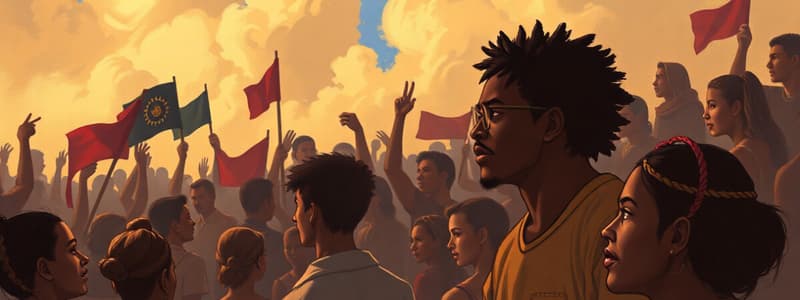Podcast
Questions and Answers
What event triggered massive demonstrations in 2020?
What event triggered massive demonstrations in 2020?
- The rise of anti-Asian hate crimes
- The start of the pandemic
- The death of George Floyd (correct)
- The shooting of a Korean family
Racism only affects Black individuals in society.
Racism only affects Black individuals in society.
False (B)
What percentage of reported anti-Asian incidents occurred since the beginning of the COVID-19 pandemic?
What percentage of reported anti-Asian incidents occurred since the beginning of the COVID-19 pandemic?
More than 9,000
Racism claims that the human species can be divided into different __________ groups.
Racism claims that the human species can be divided into different __________ groups.
Match the following events with their related details:
Match the following events with their related details:
Which of the following statements about racism is accurate?
Which of the following statements about racism is accurate?
The suspect in the shooting of the Korean couple had a known connection with them.
The suspect in the shooting of the Korean couple had a known connection with them.
What characterized the beliefs held by proponents of racism regarding human groups?
What characterized the beliefs held by proponents of racism regarding human groups?
What is the term used to describe dividing society by race?
What is the term used to describe dividing society by race?
The doctrine of 'separate but equal' effectively eliminated racial inequalities.
The doctrine of 'separate but equal' effectively eliminated racial inequalities.
What is genocide?
What is genocide?
The Holocaust is an example of __________.
The Holocaust is an example of __________.
Match the following terms with their definitions:
Match the following terms with their definitions:
What climax of racism is indicated to have occurred in the twentieth century?
What climax of racism is indicated to have occurred in the twentieth century?
The civil rights movement of the 1950s and '60s had no effect on racism in the United States.
The civil rights movement of the 1950s and '60s had no effect on racism in the United States.
What methods have societies used to combat racism since the mid-20th century?
What methods have societies used to combat racism since the mid-20th century?
The __________ Amendment invalidated regulations aimed at limiting the voting power of racial minorities in the United States.
The __________ Amendment invalidated regulations aimed at limiting the voting power of racial minorities in the United States.
Match the following events or terms with their significance:
Match the following events or terms with their significance:
What was a vital feature of the racist regime maintained by state law in the American South?
What was a vital feature of the racist regime maintained by state law in the American South?
Scientific studies have supported the validity of racist genetics, or eugenics.
Scientific studies have supported the validity of racist genetics, or eugenics.
What were African Americans depicted as in extreme racist propaganda?
What were African Americans depicted as in extreme racist propaganda?
The efforts to understand racism emphasize its role in eliciting __________ and distrust.
The efforts to understand racism emphasize its role in eliciting __________ and distrust.
What year was the Universal Declaration of Human Rights set forth by the United Nations?
What year was the Universal Declaration of Human Rights set forth by the United Nations?
What belief is central to racist thinking?
What belief is central to racist thinking?
Racism rejects the idea of social integration.
Racism rejects the idea of social integration.
When did the concept of race begin to develop primarily?
When did the concept of race begin to develop primarily?
Racism is frequently expressed through __________ and discrimination.
Racism is frequently expressed through __________ and discrimination.
What did the proponents of slavery use to justify their actions?
What did the proponents of slavery use to justify their actions?
Match the following historical events with their significance regarding racism:
Match the following historical events with their significance regarding racism:
Intelligence and attitudes are believed to be influenced by environment according to racists.
Intelligence and attitudes are believed to be influenced by environment according to racists.
What term is used to describe the hierarchy in which certain races are believed to have superiority over others?
What term is used to describe the hierarchy in which certain races are believed to have superiority over others?
Discrimination against low-status races became a typical __________ in many parts of the world.
Discrimination against low-status races became a typical __________ in many parts of the world.
What did the Voting Rights Act of 1965 require from jurisdictions with a history of voter suppression?
What did the Voting Rights Act of 1965 require from jurisdictions with a history of voter suppression?
Racial slurs are often condemned and can be considered as hate speech.
Racial slurs are often condemned and can be considered as hate speech.
What is racial discrimination?
What is racial discrimination?
Racial stereotypes are generalized beliefs about people based on their _____ .
Racial stereotypes are generalized beliefs about people based on their _____ .
Match the following examples of racism with their descriptions:
Match the following examples of racism with their descriptions:
Which of the following is a potential consequence of racial stereotypes?
Which of the following is a potential consequence of racial stereotypes?
Racial discrimination must explicitly mention race to be considered discriminatory.
Racial discrimination must explicitly mention race to be considered discriminatory.
Give an example of how racial discrimination can manifest in schools.
Give an example of how racial discrimination can manifest in schools.
The process of obtaining federal approval for proposed voting law changes is known as _____ .
The process of obtaining federal approval for proposed voting law changes is known as _____ .
Which type of racist belief involves projecting oversimplified expectations onto individuals?
Which type of racist belief involves projecting oversimplified expectations onto individuals?
Flashcards
What is racism?
What is racism?
The belief that the human species can be divided into different biological groups that determine behavior, success, and capabilities.
Black Lives Matter
Black Lives Matter
A movement advocating for the end of systemic racism and racial injustice.
Stop AAPI Hate
Stop AAPI Hate
A national coalition collecting data on anti-Asian incidents related to the COVID-19 pandemic.
Racial superiority
Racial superiority
Signup and view all the flashcards
Racial discrimination
Racial discrimination
Signup and view all the flashcards
Systemic racism
Systemic racism
Signup and view all the flashcards
Entrenched racism
Entrenched racism
Signup and view all the flashcards
Fixed racial characteristics
Fixed racial characteristics
Signup and view all the flashcards
Colonialism's impact on colonized populations
Colonialism's impact on colonized populations
Signup and view all the flashcards
The 20th Century's Rise of Overt Racism
The 20th Century's Rise of Overt Racism
Signup and view all the flashcards
Jim Crow Laws and their impact
Jim Crow Laws and their impact
Signup and view all the flashcards
Racist propaganda and its role
Racist propaganda and its role
Signup and view all the flashcards
Fear of racial mixing in the South
Fear of racial mixing in the South
Signup and view all the flashcards
Nazi Germany and the downfall of scientific racism
Nazi Germany and the downfall of scientific racism
Signup and view all the flashcards
Combating Racism
Combating Racism
Signup and view all the flashcards
The Civil Rights Movement in the US
The Civil Rights Movement in the US
Signup and view all the flashcards
Universal Declaration of Human Rights
Universal Declaration of Human Rights
Signup and view all the flashcards
The 24th Amendment
The 24th Amendment
Signup and view all the flashcards
Racism
Racism
Signup and view all the flashcards
Race
Race
Signup and view all the flashcards
Biological Determinism
Biological Determinism
Signup and view all the flashcards
16th Century & The Transatlantic Slave Trade
16th Century & The Transatlantic Slave Trade
Signup and view all the flashcards
19th Century & Racism's Global Spread
19th Century & Racism's Global Spread
Signup and view all the flashcards
Racialized Labor Exploitation
Racialized Labor Exploitation
Signup and view all the flashcards
Racial Degeneration
Racial Degeneration
Signup and view all the flashcards
Rejection of Integration
Rejection of Integration
Signup and view all the flashcards
What are racial slurs?
What are racial slurs?
Signup and view all the flashcards
What are racial stereotypes?
What are racial stereotypes?
Signup and view all the flashcards
What is racial discrimination?
What is racial discrimination?
Signup and view all the flashcards
What is racial superiority?
What is racial superiority?
Signup and view all the flashcards
What is the Black Lives Matter movement?
What is the Black Lives Matter movement?
Signup and view all the flashcards
What is Stop AAPI Hate?
What is Stop AAPI Hate?
Signup and view all the flashcards
What is systemic racism?
What is systemic racism?
Signup and view all the flashcards
What is entrenched racism?
What is entrenched racism?
Signup and view all the flashcards
What are fixed racial characteristics?
What are fixed racial characteristics?
Signup and view all the flashcards
What are scapegoats?
What are scapegoats?
Signup and view all the flashcards
Racial segregation
Racial segregation
Signup and view all the flashcards
"Separate but equal"
"Separate but equal"
Signup and view all the flashcards
Genocide
Genocide
Signup and view all the flashcards
Hate crime based on race
Hate crime based on race
Signup and view all the flashcards
Racializing a group
Racializing a group
Signup and view all the flashcards
Study Notes
Racism Defined
- Racism claims that humans can be divided into biological groups determining behaviour, economics, and political success.
- It views races as fixed subdivisions of humans with distinct cultures.
- It believes biological factors explain social and cultural differences and that certain races are superior.
- Racism presumes differences are innate and unchanging, ignoring environmental or historical influences.
Origins of Racism
- Racism didn't emerge until the 16th century through the Transatlantic Slave Trade.
- The demand for enslaved labor in the 17th century led Europeans and Americans to justify slavery by categorizing people by "race."
- In the 19th century, racism spread globally, with Western countries dividing societies into "higher" and "lower" races.
- Colonized peoples were exploited, and discrimination became a pattern.
- Resentment and hostility toward colonizers persisted post-independence.
- Racism reached its peak in the 20th century with overtly racist regimes.
Combating Racism
- The 20th century saw global recognition of racism's harm, with efforts to raise awareness and promote understanding.
- The Universal Declaration of Human Rights (1948) aimed to combat racism in public policies.
- In the USA, the Civil Rights Movement (1950s-60s) challenged racial segregation, and anti-discrimination laws were passed (e.g. Voting Rights Act 1965).
- However, racial biases and beliefs continued into the 21st century.
Examples of Racism
- Racial slurs and stereotypes: Offending words and generalizations based on race discriminate and demean individuals or groups.
- Discrimination: Prejudicial and unfair treatment based on race, manifests in employment, housing, education, justice, healthcare, etc.
- Dividing society by race: Restricting access to resources, institutions, services, and opportunities based on race (e.g., apartheid, Jim Crow laws).
- Eliminating people based on race: Hate crimes and genocide, like the Holocaust, targeting specific racial groups for elimination.
Studying That Suits You
Use AI to generate personalized quizzes and flashcards to suit your learning preferences.



